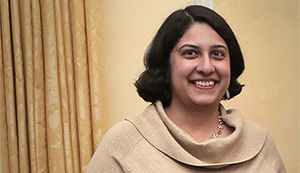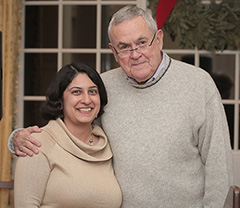Intellectual curiosity a driving force for Hirva Mamdani

Hirva Mamdani, MD, embodies one of the most powerful, human forces in the fight against cancer: curiosity.
Her inquisitive nature surfaced early in the fertile soil of her upbringing. “I grew up in a family of physicians, so I always saw my dad and siblings working very hard, taking care of patients, and making them feel better,” Dr. Mamdani says. “As you can imagine, I was little, so it kind of started out as a curiosity: How can they know so much about the human body, and how can they cure them of their illnesses?”
Dr. Mamdani recalls her dissatisfaction with what she first learned about cancer. “I learned it’s something for which nobody can offer any treatment, and once a person has it, you’re just bound to lose them. I was asking questions to my dad: ‘Dad, you’re a doctor. Can’t you treat cancer?’ That curiosity turned into an ambition to go into the field of medicine.”
She attended medical school in India and completed her residency at Wayne State University in Detroit, Mich. Oncology was a natural fit. “I thought that this particular subspecialty was the one for which I was actually looking,” Dr. Mamdani says. “In this field, you are constantly thinking about the science of cancer — what makes a normal cell turn into a malignant cell, and what makes a cancer, which is very sensitive to chemotherapy, turn into something that is resistant to chemotherapy in a matter of months — and then applying that science and knowledge to find more treatment options for the patients. This intellectual challenge is very attractive to me. For patients, being diagnosed with cancer and undergoing chemotherapy is probably the most difficult phase of their lives, so offering a holding hand for them means a lot to me.”
Presently Dr. Mamdani is a fellow at the Indiana University School of Medicine where she has developed her interests within oncology. “My first oncology clinic was with Dr. Larry Einhorn, and that was the lung cancer clinic. Dr. Einhorn is one of the best mentors one could get,” she reflects. “Working with him in the lung cancer clinic, I started developing my interest in thoracic oncology. Then I worked with Dr. Nasser Hanna and Dr. Shadia Jalal which consolidated my interest in this  field. I learned from them not just how to treat cancer, but also how to conduct research — both clinical as well as bench research — and that is, I think, one of the key areas of oncology that you need to be trained in: how to contribute to research.”
field. I learned from them not just how to treat cancer, but also how to conduct research — both clinical as well as bench research — and that is, I think, one of the key areas of oncology that you need to be trained in: how to contribute to research.”
[Photo: Hirva Mamdani, MD (left) and HCRN co-founder and William B. Fisher, MD.]
Dr. Mamdani has made significant contributions to oncology research in collaboration with Hosier Cancer Research Network. Currently she is working on immunotherapy in lung cancer and esophageal cancer. HCRN recently honored Dr. Mamdani as the 2015 recipient of the George and Sarah Jane Fisher Young Investigator Award. The $15,000 award, established in 2011 by William B. Fisher, MD, and others through the George and Sarah Jane Fisher Fund, is given annually to an Indiana University oncology fellow or faculty member who has made significant contributions to clinical or basic science research in collaboration with Hoosier Cancer Research Network. Dr. Fisher established the George and Sarah Jane Fisher Fund in the mid 1990s in memory of his mother, Sarah Jane, and brother, George, both of whom died of cancer within the span of three years. Dr. Fisher is a co-founder of Hoosier Cancer Research Network and served as the organization’s vice chair until 2000.
Dr. Mamdani plans to use the funding from the award to advance her research. “I’m thinking of directing that to one of my areas of research interest: platinum-resistant small-cell lung cancer,” she says. “Platinum causes DNA damage, and the cell needs to repair it to survive the attack from the platinum. We want to see if DNA repair pathways are overactive in resistant small-cell lung cancer. This project will include getting tissue biopsy from patients when they are initially diagnosed and then to get another tissue sample when the disease has progressed so we can compare the expression of DNA repair proteins in the same patient rather than different groups of patients. To my knowledge this type of research has not been conducted so far. I want to conduct it as a pilot study in a small number of patients, and this award will be very useful for that.”
Dr. Mamdani has found HCRN to be a valuable partner in research. “I got associated with Hoosier Cancer Research Network through designing clinical trials with both Dr. Jalal and Dr. Hanna. I wasn’t familiar with HCRN before coming to this fellowship, but now I know it very well. I think, to an investigator, it provides a very strong platform to conduct clinical research. The support that you get from HCRN is just so much, starting from protocol development, registration, and all other aspects of clinical trial conduction. it’s also a channel through which you can communicate to other academic centers, to pharma companies, and even the community centers.”
About Hoosier Cancer Research Network:
Hoosier Cancer Research Network (formerly known as Hoosier Oncology Group) conducts innovative cancer research in collaboration with academic and community physicians and scientists across the United States. The organization provides comprehensive clinical trial management and support, from conception through publication. Created in 1984 as a program of the Walther Cancer Institute, Hoosier Cancer Research Network became an independent nonprofit clinical research organization in 2007. Since its founding, Hoosier Cancer Research Network has initiated more than 150 trials in a variety of cancer types and supportive care, resulting in more than 300 publications. More than 4,600 subjects have participated in Hoosier Cancer Research Network clinical trials.

Facebook
Hoosier Cancer Research Network on Facebook
Linked In
You Tube
Twitter